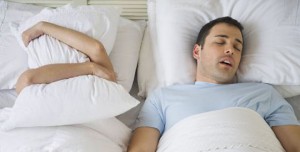 Mr Sanjiv Singh has always been known in his office for his alertness and presence of mind. However, the last few months, he would embarrassingly find himself dozing off in meetings and forgetting many things. When he went for his annual check up to his physician, he was surprised when his doctor asked him, “Do you snore a lot? Do you feel very sleepy in the day?” He found answers to all his queries when his sleep studies revealed that he was suffering from Obstructive Sleep Apnea.
Mr Sanjiv Singh has always been known in his office for his alertness and presence of mind. However, the last few months, he would embarrassingly find himself dozing off in meetings and forgetting many things. When he went for his annual check up to his physician, he was surprised when his doctor asked him, “Do you snore a lot? Do you feel very sleepy in the day?” He found answers to all his queries when his sleep studies revealed that he was suffering from Obstructive Sleep Apnea.
Do you have symptoms of Sleep Apnea?
- Do you snore on more than three nights a week?
- Have your family members pointed out that your snoring is loud enough to be heard through a door or wall?
- Have you been told by your spouse that you tend to gasp or stop breathing for a brief moment when you are sleeping?
- Do you fall asleep while driving or at a traffic light or when you are not busy?
What do you mean by Sleep Apnea?
If you replied yes to most of the above questions, you may have symptoms of sleep apnea. Sleep apnea is a condition in which your breathing is affected while you are sleeping. Your breathing becomes very shallow and is briefly interrupted for 10-20 seconds when you suffer from sleep apnea. These pauses in your breathing can occur for hundreds of times a night. This means that you get to spend less time in the deep sleep phase which is restorative for the body. Spending more time in light sleep phase causes you to be less alert and energetic the next day. Gradually sleep deprivation is said to go on to cause serious health problems over a period of time like high blood pressure, diabetes, stroke, weight gain and even heart disease.
What are the Symptoms of Sleep Apnea?
Below are the common signs and symptoms of Sleep Apnea:
- Loud Snoring
- Episodes of pauses in breathing, which have been seen by someone else
- Waking up abruptly from sleep along with shortness of breath
- Waking up with a dry mouth or sore throat
- Morning headaches
- Excessive sleepiness during the day
- Difficulties with attention or concentration or memory
- Irritability
Is every snoring a sleep apnea symptom?
Every person who snores does not have sleep apnea and every sleep apnea patient may not snore. So how can you make out the difference? The biggest difference is how you feel in the day after you wake up. If you feel sufficiently rested, you are less likely to have sleep apnea. Normal snoring does not interfere too much with your sleep quality. Normal snoring is also less likely to cause you to suffer from extreme tiredness and drowsiness during the day.
If your spouse too has been complaining about your snoring and you too suspect sleep apnea, do visit your doctor today. If you are older than 40, have a large neck size, are overweight, smoke or have someone in the family with sleep apnea, you may be at risk for sleep apnea symptoms too.
If your sleep studies have diagnosed you with sleep apnea, you can consider the option of homeopathic treatment as a supportive option with a limited role for your sleep apnea symptoms. Do leave us your contact details below to get in touch with doctors at LifeForce Homeopathy. To know more about Dr Rajesh Shah’s homeopathic treatment, give us a call at +91-22-66888888 or leave us an email at info@lifeforce.in or visit http://www.askdrshah.com/sleep-apnea-syndrome.aspx





atorvastatin cost purchase lipitor for sale lipitor 10mg for sale
buy finasteride 5mg generic propecia 1mg price order diflucan online cheap
ciprofloxacin 500mg for sale – buy baycip amoxiclav ca
buy ciprofloxacin generic – buy myambutol 1000mg pills brand clavulanate
buy flagyl pills – buy cefaclor 500mg generic buy azithromycin 500mg generic
order generic valacyclovir 1000mg – cheap nemasole pills zovirax 400mg canada
ivermectin 12mg tablet – buy aczone gel for sale order tetracycline 250mg sale
metronidazole where to buy – cefaclor 250mg capsules zithromax 500mg drug
lasix 100mg oral – furosemide for sale buy capoten 25mg pill
metformin for sale – cipro cheap buy lincomycin 500mg for sale
clomipramine online – buy asendin pills order sinequan 75mg generic
order atarax without prescription – buy buspirone 10mg generic buy endep 25mg
augmentin 375mg usa – zyvox online buy buy cipro paypal
cheap amoxicillin pills – order keflex 125mg generic ciprofloxacin price
buy cleocin 150mg online cheap – doxycycline online chloramphenicol sale
ivermectin 6mg online – stromectol tablets for humans cefaclor 500mg usa
buy albuterol 4mg generic – order albuterol inhaler generic theophylline
order depo-medrol – buy astelin nasal spray for sale astelin 10 ml nasal spray
order desloratadine pill – order clarinex buy albuterol pill
micronase 2.5mg brand – actos order online buy cheap forxiga
order prandin generic – buy repaglinide pills brand empagliflozin 10mg
order glucophage 500mg generic – januvia pills buy acarbose 25mg sale
lamisil 250mg tablet – grifulvin v pills order grifulvin v generic